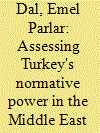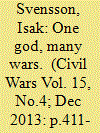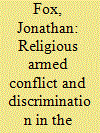| Srl | Item |
| 1 |
ID:
126677


|
|
|
|
|
| Publication |
2013.
|
| Summary/Abstract |
In this study, the extent to which Turkey has been pursuing a normative foreign policy (NFP) toward the Arab revolts will be analyzed on the basis of Nathalie Tocci's description of a NFP actor, built on the following three conceptual tools: normative goals, normative means and normative results or impact. With a special emphasis on the conditioning factors that impacted Turkey's pursuit of an NFP, this paper also investigates the limitations and effectiveness of Turkey as an NFP actor in Middle East and North Africa (MENA) in order to understand if Turkey's role in the changing MENA region has gone beyond rhetoric to become empirically justified. It concludes that despite increasing normative representations and rhetoric in its foreign policy, Turkey does not currently possess a cohesive and ambitious NFP agenda and, thus, is still far from being a normative power.
|
|
|
|
|
|
|
|
|
|
|
|
|
|
|
|
| 2 |
ID:
164531


|
|
|
|
|
| Summary/Abstract |
We examine the validity of the guns-versus-butter hypothesis in the pre-Arab Spring era. Using panel data from 1995 to 2011 – the eve of the Arab uprisings – we find no evidence that increased security needs as measured by the number of domestic terrorist attacks are complemented by increased military spending or more importantly ‘crowd out’ government expenditure on key public goods such as health care. This suggests that both expenditure decisions were determined by other considerations at the government level.
|
|
|
|
|
|
|
|
|
|
|
|
|
|
|
|
| 3 |
ID:
126013


|
|
|
|
|
| Publication |
2013.
|
| Summary/Abstract |
This paper examines the religious dimensions of armed conflicts in the Middle East and North Africa (MENA), a region where the monotheistic religions of Judaism, Islam, and Christianity traditionally dominate. Applying a regional perspective, this study finds that about half of the armed conflicts in the MENA region were between parties, where at least one side had made explicit reference to religion in their basic demands, and this category of conflicts has increased substantially over time. Why are religious civil wars becoming relatively more common over time in the MENA region? I argue that the relatively high frequency of religious armed intrastate conflicts in the region can be explained by three major empirical regularities: (1) the intractability of interreligious conflicts; (2) the spread of several but relatively shorter intrareligious disputes; and (3) the increasingly transnational aspect of religious disputes in the MENA region. Although these trends have been countered by the emergence of institutional settlements of some of the armed conflicts, these types of conflict management and conflict resolution attempts have, so far, been too few to generate a general shift in the basic empirical patterns. This paper provides an empirical overview over the main patterns and ends by identifying some important avenues for future research.
|
|
|
|
|
|
|
|
|
|
|
|
|
|
|
|
| 4 |
ID:
126012


|
|
|
|
|
| Publication |
2013.
|
| Summary/Abstract |
The role of religion in armed conflict and discrimination in the Middle East and North Africa (MENA) is receiving increased attention as the focus of the region's conflicts shifts from nationalism and ethnicity to religion. All of the contributions to this section seek to build knowledge and theories to understand how religion contributes to conflict and discrimination, focusing on the MENA, the world region where religious conflict and discrimination are most prominent. The three articles in this special section of Civil Wars address these changes, each looking at them from a unique perspective including both comparative and quantitative methodology.
|
|
|
|
|
|
|
|
|
|
|
|
|
|
|
|
| 5 |
ID:
124774


|
|
|
|
|
| Publication |
2013.
|
| Summary/Abstract |
In the wake of the recent Arab revolutions, the European Union (EU) has sought to provide genuine and substantial support to a range of Arab social movements in the region's emerging polities. Yet the EU's recent democracy-promotion efforts represent a puzzle for earlier critical approaches to the relationship between Europe and the Middle East and North Africa (MENA), which argue for the existence of hegemonic patronage linkages. We argue, however, that the EU's attempts at democracy promotion in the MENA region may be understood through a governmentality framework, despite the limitations of such an approach. Specifically, the EU is actively promoting neoliberal policies in the aftermath of the Arab Spring in order to foster a mode of subjectivity that is conducive to the EU's own norms and interests. What we observe are not just innocent attempts at democracy promotion, but a form of politics and economics that seeks to subject the agency on the 'Arab street' to EU standards. We conclude by going over the radical plurality of the Arab street, and show how it was in fact earlier neoliberal reforms by their former regimes that created the conditions of possibility for the recent revolutions in Tunisia and Egypt.
|
|
|
|
|
|
|
|
|
|
|
|
|
|
|
|